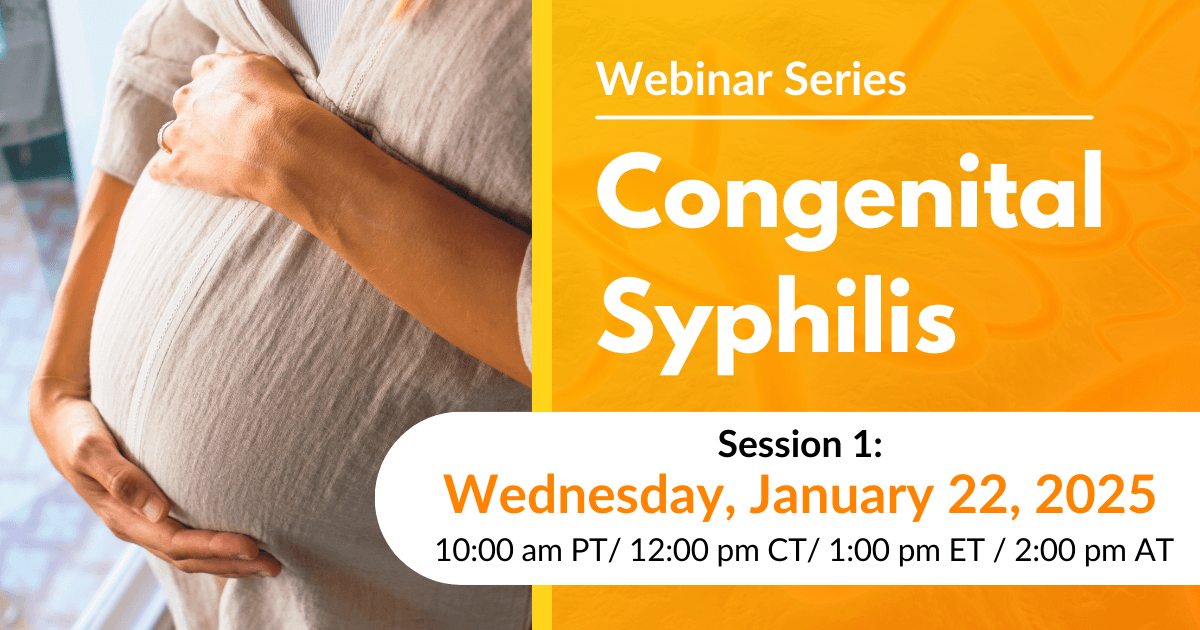
This webinar will be provided in English with simultaneous interpretation into Spanish.
While congenital syphilis is completely preventable, from 2014 to 2023, cases rose from 462 to 3,882 cases per year – an increase of 740.3%. Although the population most affected by syphilis remains men who have sex with men (MSM), poorly understood changes among heterosexuals warrant additional attention and effort to prevent congenital syphilis and related infant deaths, stillbirths, and debilitating health outcomes that can affect infants that survive over the course of their life.
Join Health Outreach Partners (HOP) and Migrant Clinicians Network (MCN) for this two-part series that will look at congenital syphilis among migrant and seasonal agricultural workers (MSAWs) and how their migratory status creates additional barriers to care. In addition, we will discuss the role of community health clinics and health departments to provide opportunities for testing, appropriate syphilis staging, completion of treatment, and partner services.
Session 1: January 22, 2025
Session 2: January 29, 2025
Session 1
At the conclusion of this session, participants will be able to…
- Discuss changes to syphilis epidemiology in recent years resulting in significant increases in congenital syphilis
- Describe risks for syphilis and congenital syphilis for migrant and seasonal agricultural workers that identify as women, and methods to prevent congenital syphilis
- Practice critical thinking, problem-solving and decision-making ability using congenital syphilis case studies & local program examples
Session 2
At the conclusion of this session, participants will be able to…
- Summarize variations in local testing algorithms for pregnant people, and current syphilis treatment guidelines;
- Discuss the purpose and value of coordinating with local health departments for partner services and completion of syphilis treatment;
- Discuss whole person factors that impact reinfection and the effort required for a patient to access care from a provider.
Presenters

MPH
Renai Edwards, MPH (she/her/ella) comes to MCN after many years working at city, county, state, national, and international government agencies in infectious disease prevention, control, and surveillance programs, with a focus on community education and training for clinicians and clinic staff. Her specialties include HIV/STI/sexual health, tuberculosis, refugee/immigrant health, maternal child health, and strategic planning with justice, equity, diversity, and inclusion as the base.
She began her career as a health extension volunteer in the Peace Corps in Honduras, where she learned about the day-to-day life of people, and the push/pull factors that cause them to migrate. Since then, she has incorporated health equity, cultural humility, and language access into her programs, while pushing government agencies to improve in those areas as well.
Edwards holds a Master of Public Health degree from the University of New Mexico, and Bachelor’s degrees in anthropology and Hispanic studies from the University of Michigan. She loves to cook food from around the world, hiking with her dog Mocha, and has recently taken up genealogy to learn more about her family history.

Victor Ruiz was born in Gilroy, CA and grew up/spent most of his life in the central region of Washington State. He identifies as Latin American and Native American (Yakama Tribe). He graduated from Central Washington University with a Bachelor of Arts in Law and Justice, specializing in Legal Studies and Sociology. He started his career in public health in HIV/STI prevention as a volunteer promoting and educating people on HIV/STI prevention and connecting people to testing. He felt confident that public health was the career path that he wanted to take so he started working as a Field Services Consultant with the Washington State Department of Health in 2018. Through his experience as a Disease Intervention Specialist, Victor currently supervises the Care Connection Team, a team people who helps pregnant people, people living with HIV and people with Hepatitis C connect and engage with care in rural communities in central Washington State.

Benjamin Meana (pronounced: behn-hah-MEEN meh-AH-nah] has worked in public health for over 8 years within community-based organizations, local health departments, and currently at the Washington State Department of Health as a Sexual Health Coordinator for vaccine preventable conditions that can be transmitted sexually. Most of his public health career has been in HIV/STI prevention, but he also has experience with emerging conditions, such as COVID-19 and mpox, and immunization programs. He obtained his Master of Science in Epidemiology at the University of Washington in 2024 to further his career in public health.
Continuing Education Credit (CEU)

Application for CME credit has been filed with the American Academy of Family Physicians. Determination of credit is pending.

Migrant Clinicians Network is accredited as a provider of nursing continuing professional development by the American Nurses Credentialing Center's Commission on Accreditation.



